人教版英语七年级下unit10-12重点内容
_人教版英语七年级下册 Unit 10 ---12重难点精讲
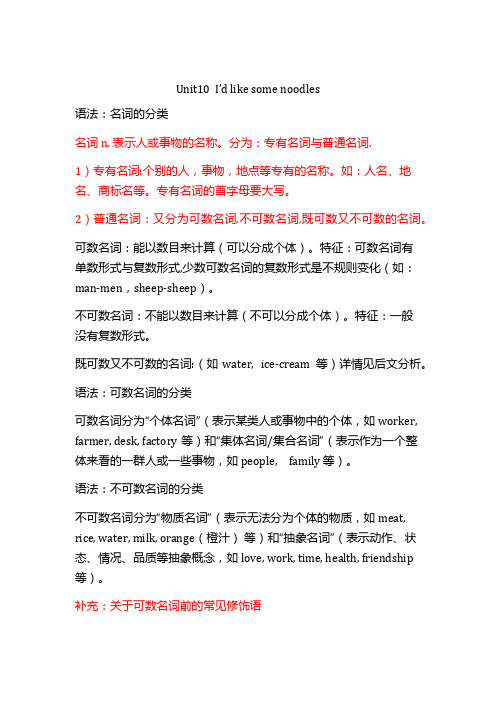
Unit10 I’d like some noodles语法:名词的分类名词 n. 表示人或事物的名称。
分为:专有名词与普通名词.1)专有名词:个别的人,事物,地点等专有的名称。
如:人名、地名、商标名等。
专有名词的首字母要大写。
2)普通名词:又分为可数名词,不可数名词,既可数又不可数的名词。
可数名词:能以数目来计算(可以分成个体)。
特征:可数名词有单数形式与复数形式,少数可数名词的复数形式是不规则变化(如:man-men,sheep-sheep)。
不可数名词:不能以数目来计算(不可以分成个体)。
特征:一般没有复数形式。
既可数又不可数的名词:(如water, ice-cream等)详情见后文分析。
语法:可数名词的分类可数名词分为“个体名词”(表示某类人或事物中的个体,如worker, farmer, desk, factory等)和“集体名词/集合名词”(表示作为一个整体来看的一群人或一些事物,如people,family 等)。
语法:不可数名词的分类不可数名词分为“物质名词”(表示无法分为个体的物质,如meat, rice, water, milk, orange(橙汁)等)和“抽象名词”(表示动作、状态、情况、品质等抽象概念,如love, work, time, health, friendship 等)。
补充:关于可数名词前的常见修饰语1)可数名词单数表示泛指时,前面要用不定冠词a/an,表示特指时,前面要用定冠词the;2)可数名词前可用具体的数词来表示具体的数量。
不可数名词前不行。
e.g. one apple, two apples.3)现阶段只能修饰可数名词的有:many, a few, few, these, those。
3)现阶段既可以修饰可数又可以修饰不可数的有: this, that, some, any, a lot of, lots of, all 等。
语法:可数名词单复数的变化规则一、规则变化1)一般情况下,直接在名词词尾加-s.e.g. apple—apples2)以s, ss, x, ch, sh结尾的名词,在词尾加-es.e.g. box—boxes boss—bosses watch—watches wash—washes class—classes bus—buses fox—foxesdish—dishes3)以“辅音字母+y结尾”的名词,改y为i加-es.e.g. family—families comedy—comedies city—cities strawberry—strawberries4)以“元音字母+y结尾”的名词,直接加-s .e.g. boy—boys day—days key—keys5)以o结尾的名词,无生命的直接加-s;有生命的加-es.e.g. photo—photos potato—potatoes zoo—zoos tomato—tomatoes hero—heros(英雄)6)以f或 fe结尾的名词,先将f或fe改为v,再加-es. knife—knives(小刀) leaf—leaves(树叶)half—halves(一半的人或事物) wife—wives(老婆)wolf—wolves(狼)二、不规则变化(几种典型的类型,所给例子并非全部)1)男女(a变e)man—men woman—women2)鹅足牙(oo变ee)goose—geese foot—feet tooth—teeth3)老鼠虱子mouse—mice louse—lice4)孩子child—children5)单复同型的情况说明:有一种不规则变化称作“单复同型”。
七年级英语下Units10-12知识点归纳人教版

七年级(下)上半期Unit 10-12 知识点归纳Unit 10 Where did ou go on vacation1 a morning整个上午a 着重“整体”,指各个个体或各个部分组成的“全部的、所有的整体”。
可修饰可数名词复数形式和不可数名词。
位于定冠词、指示代词、物主代词、基数词的前面。
常用短语有:a da, a night, a da ong, a the morning a hi friend, a the five gir, a the wor英国人在a da, a night 中常不用the。
在其他情况下,美国人常用the。
2 be ot迷路,丢失ot 为动词oe的过去分词,在此作形容词“丢了的,迷路的”。
3★decide to do决定做…… good 相当好5★have great fun doing th做某事很有乐趣。
此处的fun为不可数名词“乐趣”。
great 可以换成其他的词,如:have much /ome fun doing th6★find b doing th发现某人在做某事find之后必须跟名词或宾格人称代词,其后动词必须用-ing形式7 he ae 被称作使役动词,其后须跟不带to的动词不定式。
类似的表达方式还有:et b do th9 --Where did ou go on vacation 你去哪儿度假了--I went to the mountain 我去大山里了。
1where did ou go…是一般过去时的疑问句,did.是助动词2went是go的过去式,实义动词的过去式没有人称和数的变化。
3实义动词一般过去式的一般疑问句以助动词did开头。
如:①--What did ou do eterda afternoon你昨天下午在做什么?--I e to he 你认为情景喜剧怎么样I howed each tudent even thing, and aed them what the thought about each thing★①询问对某样事物的看法时:thin of 和thin about 可以替换。
Unit1012单词知识点讲义人教版英语七年级下册
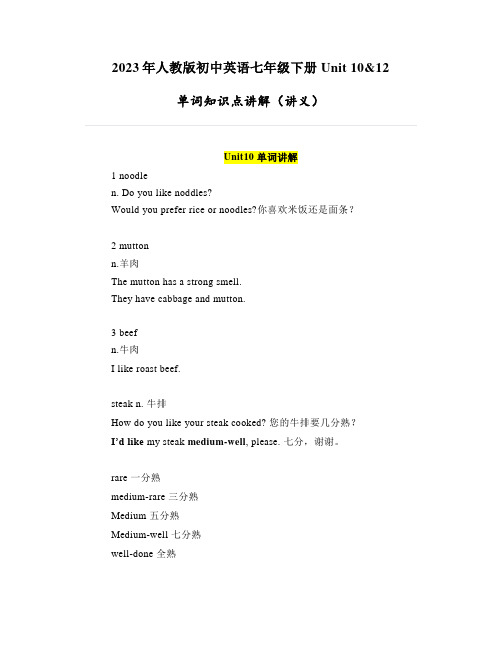
2023年人教版初中英语七年级下册Unit 10&12 单词知识点讲解(讲义)Unit10 单词讲解1 noodlen. Do you like noddles?Would you prefer rice or noodles?你喜欢米饭还是面条?2 muttonn.羊肉The mutton has a strong smell.They have cabbage and mutton.3 beefn.牛肉I like roast beef.steak n. 牛排How do you like your steak cooked? 您的牛排要几分熟?I’d like my steak medium-well, please. 七分,谢谢。
rare 一分熟medium-rare 三分熟Medium 五分熟Medium-well 七分熟well-done 全熟black pepper sauce 黑椒酱sweet chilli sauce 甜辣酱honey mustard sauce 蜂蜜芥末酱ketchup 番茄酱barbecue sauce 烧烤酱thousand island saucesalad dressing 沙拉酱mayonnaise 蛋黄酱4 cabbagen.甘蓝;卷心菜;白菜Do you like cabbage?I have 2 cabbages.5 potaton.土豆I like roast/baked/boiled/fried potato es我喜欢烤/煮/炸土豆子。
6 specialadj.特别的;特殊的There is something special about this place. She is a very special friend.The gift is special to me.Our special guest today is from the UK. specially adv.特别地;专门地The cake is specially for you.n.特色What’s the special today?今天的特色菜是什么?7 wouldwill的过去式+动词原形表示过去将要He said he would love me forever.I told him that I would not come.Would you mind opening the window? (表客气地请求) Would you please give me a hand? (表客气地请求)Would you like a sandwich? (客气地建议或邀请)Would you have dinner with me tonight? (客气地建议或邀请)8 would like想要 : 愿意I would like a place of my own.我想要个自己的地方。
人教版新目标七年级英语下册10——12单元知识点小结

人教版新目标七年级英语下册10——12单元知识点小结Unit 10 I’d like some noodles.1,名词可分为可数名词和不可数名词(不可数名词作主语,谓语动词用单数)。
可数名词又分单数和复数。
1一般+s;2以-s,-x,-ch,sh结尾的名词+es;3辅音+y,把y变i,再+es;4以-o结尾的,有生命的+es (negro—negroes;hero—heroes;tomato—tomatoes;potato—potatoes);无生命的+s;⑤以f,fe 结尾的名词,改f,fe为v+es (leaf—leaves;knife—knives)(例外:roofs,chiefs)⑥单复数同形:sheep,deer.不规则变化:man—men;woman—women;child—children;foot—feet;tooth—teeth等2,would like sth. 想要某物Would you like some …? 你想要一些……吗?——Yes, please./ ——No, thanks.would like to do sth. “想要做某事”。
Would you like to …? 你愿意去做……吗?—Yes, I’d like / love to./—I’d like/ love to. But I’m too busy.would like sb to do sth “想要某人做某事”。
3,order:order food take/ have one’s orderIn order to为了In the order按顺序Order/ book a room 预定房间Order sb(not)to do sth命令4,special和especialSpecial特别的人或事物,特别的,特殊的,specials特色菜;specially专门地,特地Especial特别的,突出的,especially特别,尤其5,the number of表示“……的数量”,后面接可数名词复数。
2024年中考英语七年级下册Unit 10--12知识点总结
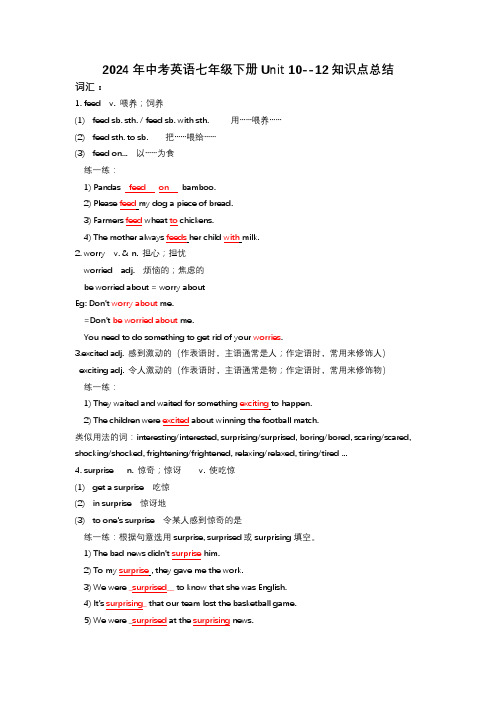
2024年中考英语七年级下册Unit 10--12知识点总结词汇:1.feed v. 喂养;饲养(1)feed sb. sth. / feed sb. with sth. 用……喂养……(2)feed sth. to sb. 把……喂给……(3)feed on... 以……为食练一练:1) Pandas feed on bamboo.2) Please feed my dog a piece of bread.3) Farmers feed wheat to chickens.4) The mother always feeds her child with milk.2. worry v. & n. 担心;担忧worried adj. 烦恼的;焦虑的be worried about = worry aboutEg: Don’t worry about me.=Don’t be worried about me.You need to do something to get rid of your worries.3.excited adj. 感到激动的(作表语时,主语通常是人;作定语时,常用来修饰人)exciting adj. 令人激动的(作表语时,主语通常是物;作定语时,常用来修饰物)练一练:1) They waited and waited for something exciting to happen.2) The children were excited about winning the football match.类似用法的词:interesting/interested, surprising/surprised, boring/bored, scaring/scared, shocking/shocked, frightening/frightened, relaxing/relaxed, tiring/tired ...4.surprise n. 惊奇;惊讶v. 使吃惊(1)get a surprise 吃惊(2)in surprise 惊讶地(3)to one’s surprise 令某人感到惊奇的是练一练:根据句意选用surprise, surprised或surprising填空。
人教版七年级下10-12重点知识整理讲解
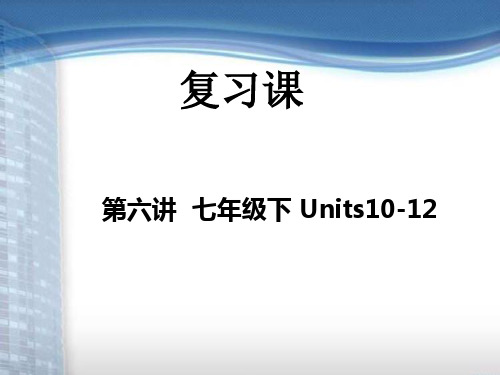
What surprising news you' ve given
me! 你的消息真让我感到吃惊!
预测训练. 8. We all feeslu_r_p_r_is_e( dsurprise ) that the disabledgirl has made so much progress in music. 9. That's vseuryr_p_ri_s_in( gsurprise ) news for us.
3. grow v.种植 ;生长;发育 ▲拓展: ( 1 )grow作及物动词时,意为“种植”
We grow vegetables in our hometown. 我们在家乡种植蔬菜。 (2)grow作不及物动词时,意为“生长,成 长”。 These vegetables are growing well.这 些蔬菜长势很好。 (3)grow作连系动词时,意为“慢慢变得
Friday.
2.一般过去时的特殊疑问句[见第二篇 第6讲] (1)疑问词+was/were+主语+其他? (2)疑问词+did+主语+动词原形+其他? 其答语根据实际情况作出回答即可。 一Where were you last week? 上周你在哪儿?
- I lived in my grandmother's home. 我住在姥姥家。
作业:
1.精选考题演练做完 2.跟读七年级下册10-12单 元单词和课文2d,语法三 英一汉
最新中考第一轮复习人教版(新目标)七下units 10-12知识点总结
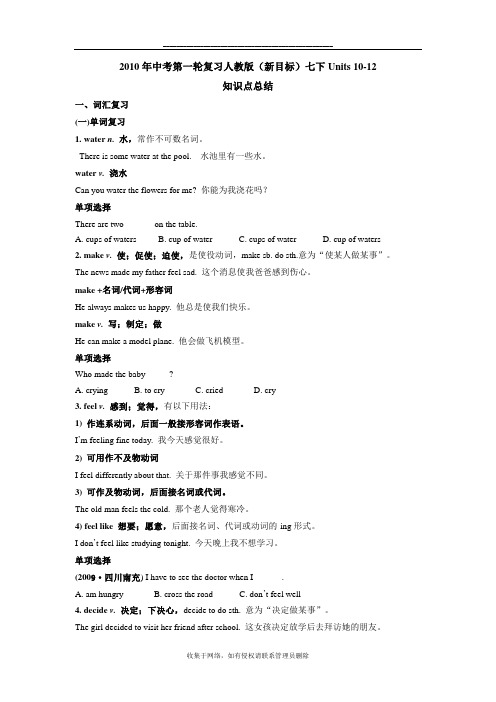
2010年中考第一轮复习人教版(新目标)七下Units 10-12知识点总结一、词汇复习(一)单词复习1. water n. 水,常作不可数名词。
There is some water at the pool. 水池里有一些水。
water v. 浇水Can you water the flowers for me? 你能为我浇花吗?单项选择There are two ______ on the table.A. cups of watersB. cup of waterC. cups of waterD. cup of waters2. make v.使;促使;迫使,是使役动词,make sb. do sth.意为“使某人做某事”。
The news made my father feel sad. 这个消息使我爸爸感到伤心。
make +名词/代词+形容词He always makes us happy. 他总是使我们快乐。
make v.写;制定;做He can make a model plane. 他会做飞机模型。
单项选择Who made the baby _____?A. cryingB. to cryC. criedD. cry3. feel v. 感到;觉得,有以下用法:1) 作连系动词,后面一般接形容词作表语。
I’m feeling fine today. 我今天感觉很好。
2) 可用作不及物动词I feel differently about that. 关于那件事我感觉不同。
3) 可作及物动词,后面接名词或代词。
The old man feels the cold. 那个老人觉得寒冷。
4) feel like 想要;愿意,后面接名词、代词或动词的-ing形式。
I don’t feel like studying tonight. 今天晚上我不想学习。
单项选择(2009·四川南充) I have to see the doctor when I ______.A. am hungryB. cross the roadC. don’t feel well4. decide v. 决定;下决心,decide to do sth. 意为“决定做某事”。
Units10-12课文重点知识--人教版七年级英语下册

Unit 10 I’d like some noodles.重点词组1. would like sth 想要某物2. would like to do sth. 想要做某事3. put on 穿上,戴上4. take one’s order 点菜5. in the beef noodles 在牛肉面里6. mapo tofu with rice 麻婆豆腐外带大米7. what kind of noodles 什么种类的面条8. a large bowl of noodles 一大碗面条9. a medium bowl of noodles 一中碗面10. a small bowl of noodles 一小碗面条11. what size 什么尺寸12.May I take your order? 可以点餐了么?13. beef noodles with carrots 带有胡萝卜的牛肉面14. green tea 绿茶15. orange juice 橙汁16. around the world 世界各地17. in different countries 在不同的国家18. birthday cakes with candles 带蜡烛的生日蛋糕19. the birthday person 寿星20.make a wish 许愿21. blow out the candles 吹灭蜡烛22. in one go 一口气,一次性的23. come true 实现24. get popular 变得流行,受欢迎25. long noodles 长寿面26. cut up 切碎/断27. a symbol of long life 长寿的象征28. be different 不同的29. be the same 一样的30. bring good luck to sb. 带给某人幸运31. have different kinds of … 有不同种类的...重点语法1、would like“想要”,相当于want, 用法亦同want,但比want委婉。
- 1、下载文档前请自行甄别文档内容的完整性,平台不提供额外的编辑、内容补充、找答案等附加服务。
- 2、"仅部分预览"的文档,不可在线预览部分如存在完整性等问题,可反馈申请退款(可完整预览的文档不适用该条件!)。
- 3、如文档侵犯您的权益,请联系客服反馈,我们会尽快为您处理(人工客服工作时间:9:00-18:30)。
Unit 10 Where did you go on vacation?
词组:呆在家:stay at home去纽约市:go to New York City拜访我的叔叔:visit my uncle去夏令营:go to summer camp 去爬山:go to the mountains去海滩:go to the beach参观博物馆:visit museums
adj. 美味的:delicious拥挤的:crowded糟糕的:awful昂贵的:expensive便宜的:cheap
重点句:
1.如果你想知道对方假期去了哪里?你会怎么问?
Where did you go on vacation?
2.你想知道对方假期是不是去了海滩,你会怎么问?
Did you go to the beach?
Unit 11 What do you think of game shows?
词组:脱口秀:talk show肥皂剧:soup opera体育节目:sports show情景剧:sitcom (situation comedy) 游戏节目:game show
表示喜爱程度:love like doesn’t mind doean’t like can’t stand
名词:太阳镜:sunglasses围巾:scarf钱包:wallet皮带:belt手表:watch钥匙扣:key ring
What do you think of …= How do you like…?
重点句:
1.你认为体育节目怎么样?我受不了。
What do you think of sports show? I can’t stand them.
2. 她认为肥皂剧怎么样?我不在乎。
What does she think of soup operas? She doesn’t mind them.
Unit 12 Don’t eat in class.
词组:上学迟到:be late for school/go to school late在走廊跑:run in the hallway在教室吃东西:eat in the class 在教室听歌:listen to music in the classroom戴帽子:wear a hat在食堂吃东西:eat in the dining hall
重点句:
1.上学不要迟到。
不要在教室内吃东西。
不许打架。
不许吸烟。
Don’t be late for school. Don’t eat in class. Don’t fight. Don’t smoke.
2.你必须穿校服。
你应该每天练吉他。
You have to wear school uniform. You should practice the guitar every day.。
